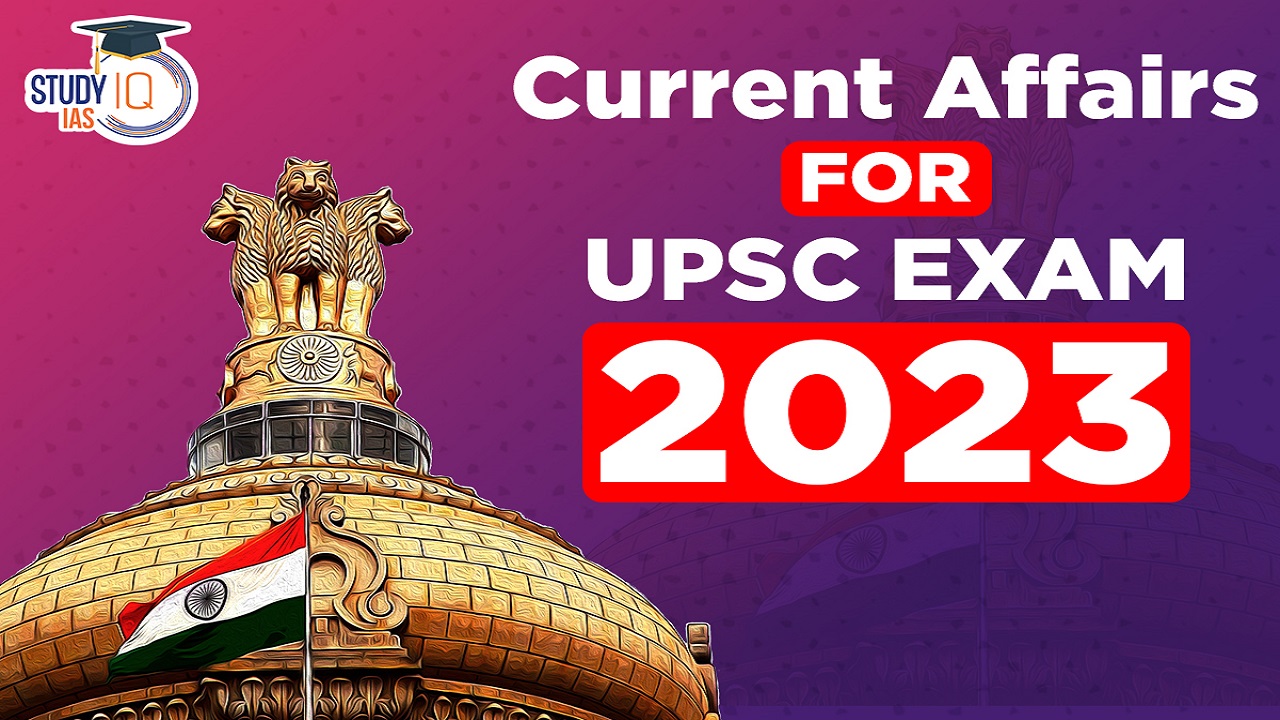Current Affairs 20th June 2023 for UPSC Prelims Exam
Gandhi Peace Prize
Context: Gita Press, Gorakhpur, has been selected for the Gandhi Peace Prize for the year 2021.
About the Gandhi Peace Prize
- It is an annual award given to those involved in social, economic, and political transformation through non-violence.
- The award was instituted by the Government of India in 1995 during the commemoration of the 125th birth anniversary of Mahatma Gandhi.
- Eligibility:
- The prize can be given to individuals, associations, institutions, or organizations.
- It can also be divided between two persons/institutions.
- It is open to all persons regardless of nationality, creed, race, or sex.
- Selection Committee: The jury is chaired by the Prime Minister. The other members of the committee are the Chief Justice of India, the leader of the single largest Opposition party in the Lok Sabha, Lok Sabha Speaker and one other eminent person who decides the awardee each year.
- Rewards: The award carries an amount of Rs.1 crore, a citation in a scroll, a plaque. Further, it also consists of an exquisite traditional handicraft/handloom item.
About the Gita Press
- Gita Press was founded officially in 1923 by Jaydayal Goyandka in West Bengal.
- It is one of the world’s largest publishers, having published 41.7 crore books in 14 languages, including 16.21 crore Shrimad Bhagvad Gita.
- The institution has never relied on advertisement in its publications, for revenue generation.
Current Affairs 19th June 2023 for UPSC Prelims Exam
President’s Rule
Context: Amidst ongoing ethnic violence and protests in Manipur over the past 45 days, government officials have stated that imposing President’s Rule would be considered only as a last resort, with the focus currently on exploring alternative measures.
What is President’s Rule?
| About |
|
| Constitutional provisions |
|
| Grounds for imposition |
|
| Parliamentary Approval and Duration |
|
| Implications of President’s rule in a state |
|
| Revocation |
|
| Scope for Judicial Review |
|
Research and Analysis Wing (RAW)
Context: Recently, the Appointments Committee of the Cabinet (ACC) appointed senior Indian Police Service (IPS) officer Ravi Sinha as Secretary, Research and Analysis Wing (RAW).
About Research and Analysis Wing (RAW):
- The Research and Analysis Wing (RAW) is the external intelligence agency of India.
- It was founded in 1968 by R. N. Kao (first director of RAW), a former Indian Police Service officer, and Indira Gandhi, the then Prime Minister of India, to handle the India’s external intelligence affairs.
- It was stablished to satisfy the need for increased intelligence that was identified during the 1962 Sino-Indian Border War and during the Indo-Pakistani War of 1965.
- The head of RAW is designated as the Secretary (Research) in the Cabinet Secretariat and is under the authority of the Prime Minister of India without parliamentary oversight.
- On an administrative basis, the Director of RAW reports to the Cabinet Secretary, who reports to the Prime Minister.
- RAW provides intelligence support to various significant operations on foreign soil.
- RAW works in cooperation with the Intelligence Bureau or other Indian intelligence agencies.
- RAW is headquartered in New Delhi and has offices in other major cities in India.
Working mechanism of RAW:
- RAW’s primary function is gathering foreign intelligence, counter-terrorism, counter-proliferation, advising Indian policymakers, and advancing India’s foreign strategic interests.
- It is also involved in the security of India’s nuclear programme.
- RAW collects military, economic, scientific, and political intelligence through covert and overt operations.
- It monitors terrorist elements and smuggling rings that transport weapons and ammunition into India.
- It also monitors the political and military development in the neighbouring countries, which have a direct bearing on India’s national security and in the genesis of its foreign policy.
More Information:
- RAW has a number of subsidiaries, including the National Technical Research Organisation (NTRO), the Special Frontier Force (SFF), the Aviation Research Centre (ARC), Electronics and Technical Services (ETS), and the Radio Research Centre (RRC).
- These subsidiaries provide RAW with a variety of specialized capabilities, such as technical intelligence, covert action, and special operations.
United Nations Human Rights Council
Context: The United Nations Human Rights chief sought for greater political support for his office as he seeks to expand its work by establishing a first-time presence in China and India.
About UNHRC:
- The United Nations Human Rights Council (UNHRC) is an inter-governmental body established by the United Nations General Assembly in 2006.
- It is responsible for promoting and protecting human rights worldwide.
- The Council replaced the former United Nations Commission on Human Rights.
- Structure: The UNHRC is composed of 47 member states elected by the United Nations General Assembly. The distribution of seats is based on equitable geographical representation, with the following regional groups:
- African States: 13 seats
- Asia-Pacific States: 13 seats
- Latin American and Caribbean States: 8 seats
- Western European and other States: 7 seats
- Eastern European States: 6 seats
- Members serve for a term of three years and are not immediately eligible for re-election after serving two consecutive terms.
- Functions: The Human Rights Council has several key functions and mechanisms to fulfill its mandate:
- Universal Periodic Review (UPR): It involves the review of the human rights records of all UN member states. The UPR provides an opportunity for states to present their human rights achievements and challenges and receive recommendations from other member states to improve their human rights situation.
- Advisory Committee: The Advisory Committee serves as the Council’s “think tank.” It consists of 18 independent experts who provide the Council with expertise and advice on thematic human rights issues.
- Complaint Procedure: The Council has a complaint procedure, also known as the Special Procedures system, which allows individuals and organizations to bring human rights violations to its attention. Special rapporteurs, independent experts, and working groups monitor and report on specific human rights issues or situations in countries.
- Resolutions and Decisions: The Council adopts resolutions and decisions on various human rights issues, including country-specific situations, thematic concerns, and emerging human rights challenges.
- Composition: The composition of the Human Rights Council has been a topic of debate and criticism. Some critics have raised concerns about the membership, as countries with questionable human rights records have been elected as members. Examples include China, Cuba, Eritrea, Russia, and Venezuela.
- The United States withdrew from the Council in 2018, citing a disproportionate focus on Israel as a concern. Israel has been a frequent subject of resolutions and scrutiny by the Council.
Hiroshima AI Process (HAP)
Context: Recently at G-7 summit, Leaders of the Group of Seven countries agreed to set up Hiroshima AI Process (HAP) to govern artificial intelligence (AI).
About Hiroshima AI Process (HAP)
- HAP is an effort by G7 countries to determine a way forward to regulate AI.
- HAP will work in cooperation with the OECD and Global Partnership on Artificial Intelligence (GPAI) will discuss on generative AI by the end of this year.
- It will discuss issues regarding generative AI tools like ChatGPT, such as intellectual property rights and disinformation.
Objectives:
- To ensure that AI development is human-centric and trustworthy.
- To make a plan for ministers from the respective countries to meet by the end of the year to establish common rules on promoting trustworthy AI.
- To ensure that AI development and implementation to be aligned with values such as freedom, democracy, and human rights.
- HAP isn’t expected to address AI regulation from a state-centric perspective.
Expected Outcome of HAP
- It can enable the G-7 countries to move towards a divergent regulation based on shared norms, principles and guiding values.
- It can become overwhelmed by the divergent views among the G-7 countries and fail to deliver any meaningful solution.
- It can deliver a mixed outcome with some convergence on certain issues and at the same time a lack of common ground on many others.


 AI Maker Labs: A Promise to build AI in ...
AI Maker Labs: A Promise to build AI in ...
 Daily Quiz 15 April 2025
Daily Quiz 15 April 2025
 How RBI Responded To Global Trade War Ch...
How RBI Responded To Global Trade War Ch...





















